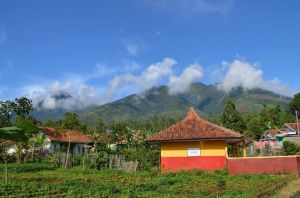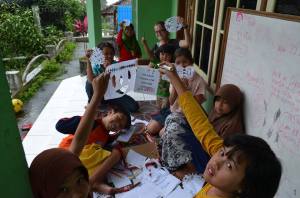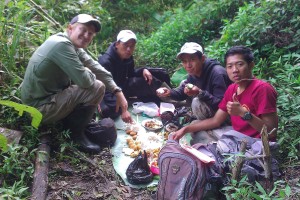As I boarded my plane in Orlando, Florida, to begin the long 30+ hour day of travel to Indonesia, I realized I was stepping largely into the unknown. Sure I knew some basic facts, but that’s about all I had: I am going to a place called Cipiganti, there are Javan slow lorises there, and somehow I will help save them.
 Getting from Jakarta to the field site exposed me to the insanity that is Indonesian traffic, but what really struck me was the very last leg of the journey. The rocky road that branches off from the main street to take you up to Cipiganti is treacherous to say the least. The last 25 minutes of my travels were filled with bumping, jostling, and bouncing up this rock pile and I began to think to myself, “What did I just get myself into?”
Getting from Jakarta to the field site exposed me to the insanity that is Indonesian traffic, but what really struck me was the very last leg of the journey. The rocky road that branches off from the main street to take you up to Cipiganti is treacherous to say the least. The last 25 minutes of my travels were filled with bumping, jostling, and bouncing up this rock pile and I began to think to myself, “What did I just get myself into?”
Well it turned out I had gotten myself involved with a great organization filled with even greater people. Within 24 hours of arriving at the field site I was on my way to see the lorises and assist with data collection. After using radio telemetry to find the loris’s general location, we used our headlamps to scan the trees looking for our focal animal. Scanning, scanning, scanning….woah! As my head torch illuminated two bright red eyes beaming back toward us, it became immediately apparent why lorises are called “firefaces.” It is one thing to see a picture of a loris, and quite another to observe one personally. They are so weird and strange in the absolute best way. I know that I won’t forget that first night out in the field as we watched Azka, our focal loris for the night, move gracefully through the treetops foraging for insects.
 My time with LFP was limited to only three weeks unfortunately, as I needed to return to school to finish my final undergraduate semester (which is where I am now, writing this instead of doing schoolwork). However during that time I was able to take part in many different aspects of LFP’s work and learned an immense amount. Assisting with the education programs was a blast, and the kids were fantastic. I think I provided them with as much entertainment as they provided me, especially with my horrible attempts at speaking to them in Indonesian. One of the most exciting projects I had the opportunity to assist with was setting camera traps. To reach the camera trap site you have to make the arduous hike up into the primary forest. The primary forest is amazing, and a glimpse into the past. As I stopped to take in all the green, all the sounds, all the life, I couldn’t help but imagine how different this island must have been before the impacts brought about by humans changed it forever.
My time with LFP was limited to only three weeks unfortunately, as I needed to return to school to finish my final undergraduate semester (which is where I am now, writing this instead of doing schoolwork). However during that time I was able to take part in many different aspects of LFP’s work and learned an immense amount. Assisting with the education programs was a blast, and the kids were fantastic. I think I provided them with as much entertainment as they provided me, especially with my horrible attempts at speaking to them in Indonesian. One of the most exciting projects I had the opportunity to assist with was setting camera traps. To reach the camera trap site you have to make the arduous hike up into the primary forest. The primary forest is amazing, and a glimpse into the past. As I stopped to take in all the green, all the sounds, all the life, I couldn’t help but imagine how different this island must have been before the impacts brought about by humans changed it forever.  After finally setting up all the cameras, it was time for an Indonesian-style picnic. We washed our hands in a cool pool at the base of a small waterfall before we sat down to enjoy our meal. The food was set out on banana leaves resulting in a delicious buffet of rice, tempeh, bala-bala, chombro, and I don’t even know what else; all I knew was that it tasted amazing.
After finally setting up all the cameras, it was time for an Indonesian-style picnic. We washed our hands in a cool pool at the base of a small waterfall before we sat down to enjoy our meal. The food was set out on banana leaves resulting in a delicious buffet of rice, tempeh, bala-bala, chombro, and I don’t even know what else; all I knew was that it tasted amazing.
Despite all the fun I had assisting in LFP’s research programs, it was clear that many challenges still face not just the slow loris, but all of Indonesia’s wildlife and remaining natural environment. Wildlife trafficking, deforestation, corruption, and cultural attitudes are just some of the many obstacles that must be overcome for conservation to truly work in Indonesia. While this list may seem daunting, organizations like LFP are working hard on the front lines to give Indonesia’s wildlife a fighting chance for survival. Conservation is like the road up to Cipiganti: always uphill, full of unexpected bumps, and sometimes it may seem like you won’t make it to the top. But with hard work and perseverance, you will reach your goal, whether that’s making it back to your house at the top of the hill after a long day or saving a Critically Endangered primate. Big challenges face the little firefaces of Java, but NGOs like the Little Fireface Project are giving them a fighting chance, and I’m proud to have contributed in a small way with the conservation of the Javan slow loris.
Taylor Tench – Student Volunteer
